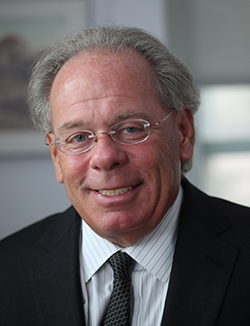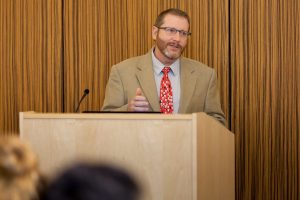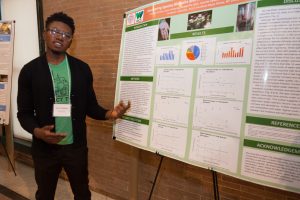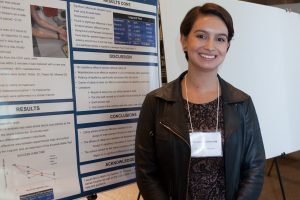
In an April 19 lecture at Fordham’s McGinley Center Commons, Steven Cohen, Ph.D., executive director of the Earth Institute at Columbia University, will discuss the nation’s evolution from preservation to sustainability. The talk, which is free and open to the public, will also cover topics related to renewable energy, the sharing economy, and technological advances.
Cohen’s lecture, “Building Sustainable Cities and Living Sustainable Lifestyles,” is part of a series of events for Earth Month, organized by the Bronx Science Consortium, a partnership between the University, the New York Botanical Garden (NYBG), Bronx Zoo, Albert Einstein College of Medicine, and Montefiore Health System, and co-hosted by Fordham’s Office of Research.
Though Earth Day is officially on April 22, the consortium has dedicated the entire month of April to environmental literacy.
The consortium’s Earth Month began on April 5 with a presentation about securing funding for scientific research, led by Walter L. Goldschmidths, vice president of and executive director of the Office of Sponsored Programs at the Cold Spring Harbor Laboratory. That same day, the University also held a research forum with guest chair Brian M. Broom of the NYBG. Fordham’s Bronx partner, the Bronx Zoo, hosted a Nature Club Family Event and Bronx Zoo Quest on April 8, which aimed to connect families to nature through activities in different locations around the zoo.
Some remaining events of Earth Month include:
- The NYBG’s dazzling garden exhibition of the artwork of American glass sculptor Dale Chihuly on April 22; On the same day, the garden will also host an Earth Day procession and behind-the-scenes tours of its Plant Research Laboratory, among other Earth Day-centric activities. On April 28, the NYBG will present a science-humanities seminar.
- The Bronx Zoo’s “Earth Fair” on April 22, which will feature products and services that are environmentally friendly; On April 29, the Bronx Zoo will host its annual 5k run/walk Run for the Wild.
Ron Jacobson, Ph.D., associate vice president in the Office of the Provost, said the series of Bronx Consortium events encourages the local community to work together for the good of the environment.
“It’s an opportunity for Fordham scientists and students to interact with other world class institutions in the Bronx,” he said.
(Earth photo by Bruce Irving, Creative Commons)
Fordham University students gathered in the Schiff Family Great Hall to take part in the 4th Annual Bronx Science Consortium Poster Symposium. The event was a presentation of student research on the high school, undergraduate, graduate, and post-doctoral levels.
“What is really so great about this symposium is the diversity of the projects,” said Ron Jacobson, Ph.D., associate vice president in the Office of the Provost and one of the event’s organizers. “It shows all the interests of our students and the many things the consortium has to offer.”

(Photos by Oscar Masciandaro)
J. Alan Clark, Ph.D., associate professor of biology and an avian expert, shared his doctoral study on penguin vocalizations. He documented the calls of feeding and mating Spheniscus penguins and tested the penguins’ responses to the calls.
He also gave the students important advice:
“Look for something that interests you, and when you see something weird, question it. There’s a wonderful world to explore, so always keep exploring,” he said, adding in jest they should “become rich and famous” as well.
Project TRUE Students Chasing Opportunity
One of the groups of high school students from Fordham’s Project TRUE (Teens Researching Urban Ecology) presented a project on what kind of small mammals live within the Zoo’s enclosure.
The project is the result of a $2.6 million grant Fordham received with the Wildlife Conservation Society in order to teach and train local high school students in ecology and other STEM subjects.

The study discovered seven species of mammals that roam free within the zoo, the most prominent being white-footed mice.
“Everyone was so welcoming. I come from a small school where there’s not a lot of interest in stuff like this,” said Stephanie Blackwood of North Salem High School. “It’s great that I got to meet kids my age who are interested in the same subjects.”
“It was much better than sitting at a desk all summer,” added Anye Frimpong, of the Bronx Academy of Software Engineering. “I got to try something new. It makes me want to pursue a liberal arts education.”
HPV Research and the Benefits of Catnip
Fordham undergraduate and graduate students were also in attendance.

Fordham senior Victoria Sieverson’s project addressed the positive benefits of catnip for humans. In her study, she tested the effectiveness of pantolactone, an active ingredient in catnip, as a repellent against black-legged ticks.
“The catnip was effective in repelling the ticks away from human skin for about two hours. When I eventually come back to this project, I want to increase the concentration levels to see if I can get it to last longer,” said Sieverson.
(The ingredient, she said, has no negative side effects on cats.)
Jacqueline Heffner, a Rose Hill junior majoring in physics, discovered a way to detect the presence of the HPV virus without long, drawn out tests.
By creating a microsphere, she was able to decipher whether the virus was present based on shifts in the air’s frequency near the sphere’s edge. By testing for HPV infections this way instead of using biosensors, Heffner believes that diagnosis and treatment can begin more quickly.
“In developing countries, instead of wasting time taking tests and sending them miles away to a facility to get results, doctors can take samples and test the frequency right where they are,” said Heffner. “It speeds up the process and allows those who need help to get it faster.”
In all, some two dozen posters were presented. The projects were created in conjunction with the Bronx Science Consortium, an educational partnership of five Bronx institutions that focuses on bringing together science research and intellectual support from its partners.
–Mary Awad
]]>Sean Sullivan, a senior at the Gabelli School of Business, and Margaret Desmond, a senior at Fordham College at Rose Hill, were selected to take part in Innovate NYC, a collaboration between New York City universities and the DO School. The DO School, which is based in New York and Germany, supports the spreading of social impact and innovation by committed individuals and organizations. The initiative is supported by the Newman’s Own Foundation.
For seven months, Sullivan and Desmond will attend sessions at the DO School that focus on entrepreneurial methods and techniques for effecting genuine change. The students will be tasked with the “The Shared Resource Challenge,” a challenge developed in cooperation with the New York City Economic Development Corporation, to create an innovative product or service that improves access to critical resources for nonprofits and social enterprises in New York City.
Ron Jacobson, PhD, associate vice president in the Office of the Provost, said the innovative collaboration, which also features Columbia University, The Cooper Union and The New School, will provide an opportunity for students to learn outside of the classroom. Fordham committed to this exact kind of experience when it was designated in April 2014 as an Ashoka “Changemaker campus.”
“Students can come out of Fordham with not only knowledge and values, but also real world skills and engagement with the community, and having worked with others to learn processes and help find solutions to significant social problems,” he said.
Desmond, an anthropology and philosophy double major who also is in the pre-med program, said she applied to the program because she hopes to eventually work for a non-profit in the medical sector.
“It’s a chance to meet a lot of people who are involved in innovative programs and try to learn from them and make those connections, and to spend time with people creating something tangible and positive,” she said.
Sullivan said he was intrigued by networking possibilities, as well as the experiential education that the DO School offers. While at Fordham, he has majored in finance and interned for the Environmental Defense Fund.
“I want to shift more toward social innovation and being a social entrepreneur. Even if it’s not right after graduation, I want to have that mindset throughout my career,” he said.
“It’s great that we can get all these schools together, because we are all in similar situations.”
]]>Under the designation “Ashoka U,” Fordham joins 25 other universities and colleges around the nation that are helping change the world through social innovation. They include fellow Jesuit schools Boston College and Marquette University, and other top schools such as Princeton, Duke, Cornell, and Brown universities.
Ashoka is a nonprofit worldwide network that supports entrepreneurial efforts to solve social problems. Marina Kim, co-founder and executive director of the organization’s Ashoka U initiative, said Fordham fits the profile of a changemaker campus for several reasons. The University’s engagement with the community in the Bronx is one. Its focus on research in areas such as health care, technology, environmental protection, social justice, and religious dialogue is another.
The University’s Jesuit identity and commitment to teaching students to be “men and women for others” is likewise a factor, as is service learning, which is “deeply embedded into the campus culture,” Kim said.
“That’s a hugely important foundation on which to build new social entrepreneurship,” she said.
“There are a lot of building blocks already in place, and already strong, that [are]aligned with social innovation as a broader campus-wide strategy.”
Ashoka U’s main focus is strengthening networks of like-minded individuals, both within a university and within the changemaker campus network. Fordham is advancing this effort through its newly formed Fordham Social Innovation Collaboratory (FSIC), said Ron Jacobson, Ph.D., associate vice president in the Office of the Provost.
The three main themes that FSIC will address are global environmental sustainability, human well-being, and social justice and poverty.
“The whole idea of social innovation is something that Fordham as a Jesuit institution has been a part of for almost 175 years, and I think this is just another way of reaffirming the mission of the University,” he said.
“It’s going to break down some of the artificial walls that exist, in terms of curriculum within schools, and in terms of co-curricular activities, where people at one campus know about an event but people at the other campus may not.”
Michael Pirson, Ph.D., associate professor of management systems in the Schools of Business, first proposed the partnership last year. He quickly found others interested in the collaboration, including Jacobson and John Davenport, Ph.D., associate professor of philosophy. Pirson hopes it will help Fordham redefine itself based on its strengths.
“There’s so much complexity, so many big problems and big issues that we’re all faced with,” he said. “In some ways, education is lagging behind in terms of adapting to what folks need to know to make sense of the complex and always-changing environment.”
In addition to integrating curriculums so that they’re more geared toward social innovation, the partnership is leading to various initiatives that create opportunity for students. These include a social innovation workshop course—hosted by the Gabelli School of Business but open to students throughout the University—and a new student organization, the Fordham Intercampus Social Innovation Team.
Jordan Catalana, a Gabelli senior who’s majoring in business administration and minoring in sustainable business, is one of the first students to get involved. She’s a member of the Fordham chapter of the Compass fellowship program, which teaches social entrepreneurship to undergraduates.
Given Fordham’s Jesuit identity, she said, “I’ve been hoping that social innovation at Fordham would be brought to light [and]marketed to more students” as well as to faculty and administrators, she said.
The first Ashoka U-related event took place Sept. 3, when David Bornstein, author of How to Change the World: Social Entrepreneurs and the Power of New Ideas (Oxford University Press, 2007), addressed the incoming class of the Gabelli School.
— Patrick Verel
 Fordham University will offer series on learning, discovering and serving on the third Thursday of each month this fall at the Westchester campus.
Fordham University will offer series on learning, discovering and serving on the third Thursday of each month this fall at the Westchester campus.
The “Fordham Forum at Westchester” is open to the public and is free of charge.
“I am truly excited that Fordham Westchester is able to present our new Fordham Forum series to the communities we serve,” said Ron Jacobson, Ph.D., associate vice president for academic affairs and executive director of the campus. “The programs are meaningful and very relevant to the challenges we face locally, nationally and globally. They support Fordham’s ongoing mission is to engage the world and promote social justice.”
Dale Williams, executive director of the Midnight Run, Inc, kicks off the series at 7 p.m. on Thursday, Sept. 16, with “Home is Where the Heart Is.” For this forum, Williams will describe the inspiration for Midnight Run, which he founded in 1984 by organizing volunteers to deliver food and supplies at the midnight gathering places of New York City’s homeless population.
Also at the Sept. 16 forum, Dale Lindquist, associate director of the Beck Institute on Religion and Poverty at Fordham’s Graduate School of Social Service, will discuss model food pantry programs in New York City and will show clips from his documentary film.
The October 21 forum on “Haiti: How to Love Our Neighbor” will feature Maureen H. O’Connell, assistant professor of theology at Fordham, and other panelists who will discuss the crisis in Haiti and explore our responsibility as compassionate citizens of the world.
For a complete schedule of the Fordham Forum at Westchester or for more information, email [email protected], call (914) 367-3202 or visit the Fordham website.
—Gina Vergel
]]>